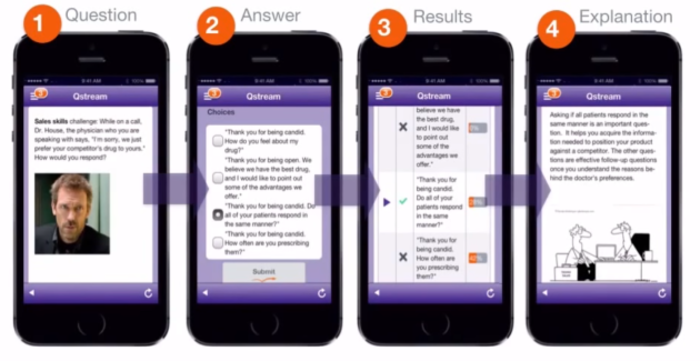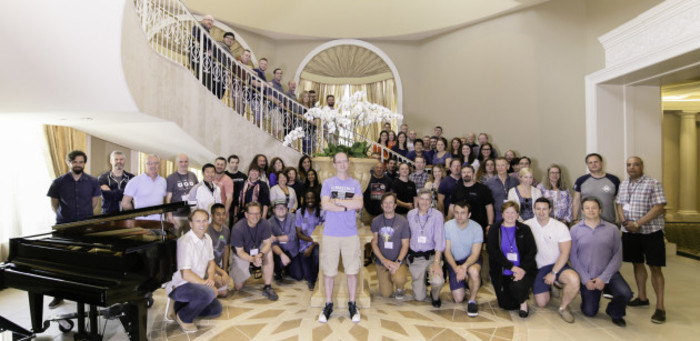This Dubliner hopes his 'healthy delusion' can help build a $1 billion tech giant
As part of our weekly How My Business Works series, we profile Qstream.
MOST PEOPLE WHO try and start their own company tend to be a bit mad.
A lot of entrepreneurs recognise this, some don’t. While Duncan Lennox comes across as a pretty mild-mannered, level-headed businessman, he is only too happy to fall into the former category.
“You need a healthy sense of delusion, you have to believe that an idea will work even when most people would tell you you’re crazy,” he says. “The vast majority of startups do fail and if most people knew how hard it was to do they wouldn’t try.”
Lennox is unlikely to fail through lack of effort. Halfway through the conversation he casually drops that he did “a bit consultancy work on the side” while he was getting his latest venture, sales software company Qstream, up and running.
So how much is a bit? “About 20 hours a week or so, so I could then spend the other 60 working on Qstream,” he tells Fora on a call from the company’s Dublin base.
You can practically hear a shrug at the other end of the phone. “I think that is the way that it is. I’ve come to realise that doing startups is what I’m wired to do, I couldn’t do anything else,” he says.
“My father had a petrol station for 30 years and I worked there during the summer. I almost didn’t know how to do anything else. Starting a business was the natural thing to do.”
The 44-year-old made the jump into the corporate world while studying at UCD, co-founding online learning company WBT Systems in 1995. This led to Lennox’s first taste of living in the US, where he helped set up the company’s first office in San Francisco before relocating to Boston.
Far from being homesick, Lennox said that the move energised him.
“It was incredibly exciting. If you want to be in the movies industry you can do it in Ireland, but to really have a go at it you have to go to Hollywood. It’s like that in tech with Silicon Valley,” he says.
“I was there through the rise the dot-com era and working with companies like Apple and Cisco, it was a very exciting time.”
Lennox put down roots in the US, marrying and having a now nine-year-old daughter. Instead of moving back to the Irish capital when WBT was sold to Dublin-based Horizon in 2006, Lennox didn’t waste any time starting a new software firm to have another go at cracking the US.
What do you do and how long have you done it for?
Qstream designs a platform that improves the skills of salespeople. Similar to the way that something like Survey Monkey allows people to easily design surveys, Qstream’s software allows users to build quick, five minute quizzes that test employees and aim to improve their knowledge or skills in a particular area.
So far the firm has focused on using the software to measure the performance of sales staff working in tech, pharmaceutical and financial services companies, although in theory it could be used in any field.
 An example of how Qstream's software works
An example of how Qstream's software works
After WBT, Lennox was casting around for a new venture and found his interest piqued by some research being carried out at Harvard, where Dr Price Kerfoot had done years of work on how to improve students’ memories of lessons.
“Although they had developed a very rigorous prototype system, it wasn’t of a commercial scale,” Lennox says. “I helped to take all the research, build a viable product and make it scaleable.
“We worked on it for about three years, testing it with thousands of users, and we decided that sales audiences were the place to start.”
After years of development the company officially launched in 2011 with a handful of employees, steadily working through the financial crisis.
Two tranches of funding, just under $3 million in September 2013 and $4 million kick at the start of last year, gave the company the firepower it needed to expand rapidly. The firm now has more than 80 staff across the board.
“We started selling in 2011 and since then we have been doubling the size of the organisation every year,” Lennox says. “In 2012 there were probably 20 people between the US and Dublin, now in Ranelagh alone we have 32 and it’ll be over 40 by the end of the year.”
What are your costs and how do you make money?
Qstream makes all of its money by licensing its software to companies. The software is used to improve the performance of salespeople and Lennox says that the company ensures it holds onto customers by making sure that the software meets an individual’s needs.
“Sales reps participate in challenges on their phone or their iPad. The phone will buzz and then you will get questions about scenarios that you would encounter, such as when a customer asks X, what do you do,” Lennox explains.
“It is structured like a game and you can compete with other staff, but the system is structured towards individuals and will automatically tailor questions to make the sales more successful.”
Companies buy a subscription to the programme per sales rep which then applies to all of their devices. “The price is $18 per user per month, so about $200 per year and then with more volume you get a higher discount,” Lennox says.
Developing the software has been a major money sink for the company to date. Although Lennox predicts that this will go down, he says it won’t completely disappear as the firm is still updating the software to keep it relevant.
Aside from standard costs such as rent and bills, Qstream pays an arm and a leg for its employees due to the skilled nature of their work.
 Duncan Lennox (centre) with Qstream's staff
Duncan Lennox (centre) with Qstream's staff
According to the most recent accounts for Qstream, the company lost about €700,000 in 2014, an amount that would not be huge for a technology company scaling fast. The records are abridged so don’t give much more detail, such as revenue or operating costs.
Lennox will disclose little further information on the company’s finances, although he adds that the accounts do not factor in much of the company’s US business and do not give a fully rounded picture of its business.
The Dublin native says that the company has just broken the $10 million mark for turnover and could be profitable if it chose to focus on that goal instead of expansion.
What is your market?
Although the company is based in the US, as are most of its customers, Lennox says that Qstream has an international user base.
“Our software is used in 140 countries and in 16 different languages because a lot of the large brands we work with are global,” he says.
“It depends on how you define it – if that is by where the cheque is written, then most of the money comes from the US and Europe, with some from Asia and South America.”
The company specialises in targeting sales teams in specific industries. The first sector that it looked to was pharma, and Qstream says its software is used by 14 of the industry’s top-15 companies, including giants such as Pfizer.
The firm has recently expanded into financial services and tech, an industry spread that Lennox says the company is content with at the moment. The firm has about 200 customers, but Lennox says that each of those companies would likely have several thousand people subscribed to its software.
 Pharma giant uses Qstream's software
Pharma giant uses Qstream's software
“Life sciences is where we have focused for the past three to four years, we are now adding others, tech in particular,” he says.
“After pharma we looked at how we could adjust the profile of what we doing and ended up looking at a subsection of tech and financial services. Our ideal is to be selling products into a large, distributed sales force that is selling products into a regulated environment.
“Right now the opportunity in those three industries is enormous, potentially hundreds of millions of dollars a year and it makes sense to stay focused.”
What is the competition?
There are thousands of sales programmes littered across the internet, such as Sales Performance International, however Qstream claims that it is a ‘market leader’ in its field – although Lennox admits that it is unlikely his company will remain unchallenged for long.
A number of rivals have started springing up in the same area and Qstream has even looked to pair with a few, for example powering a learning application called QuickCheck.
“A number of small companies do knowledge reinforcement but we are rarely competing against them in deals. We offer a different value proposition. We are always more expensive than them and we still win,” Lennox says.
The Qstream boss says that getting into corporate budgets is the real challenge for the company.
“No one has a line in their budget for what we do and there are other sales products that get funded out of the same budget,” he says.
“Someone working in sales in a company may be only able to buy one or two sales software products, but not three, so we have to show why ours will be better.”
What is your vision for the company?
Lennox gives his sales pitch when describing his hopes for his company. There will be no slow, steady growth or worrying about grinding out a profit in the first quarter of a financial year.
The Dubliner wants to ramp up even faster and is hoping to pass the $100 million turnover mark in the coming years.
He thinks that if that target is achieved the company’s value will likely top $1 billion, putting it in the league of so-called ‘unicorns’ that includes tech giants like Uber and Snapchat.
 Qstream is trying to replicate the success of companies like Snapchat
Qstream is trying to replicate the success of companies like Snapchat
“If we continue to grow as fast as we have done, at about 80-100% a year, we should be able to do it in five years,” he says. “It is incredibly aggressive but I think it is doable, it is the goal that we are focused on now.”
While he thinks that the company will keep a large percentage of its workforce in Dublin, Lennox doesn’t seem to have any plans to move his family to the Emerald Isle in the near future.
“I would never say never but we are fairly settled here, my daughter was born and grew up here,” he says.
“I just took her over for her first trip to Ireland and she loved it, (but) she’ll be a teenager soon and I’m not sure it would be fair to her to uproot and move back.”
The Dubliner also has no plans on leaving Qstream for something else anytime soon. According to Lennox, a number of things have fallen perfectly into place to make this the right venture at the right time.
“I think we have a unique mix of things coming together that make Qstream work. Sometimes if you get lucky you can ride a wave and at the moment we are riding a lot of waves, like the rise of mobile.
“I’m not sure in my life that I would see that come that together again. I want to take this as far as I can.”
This article is part of our weekly series examining the nuts and bolts of businesses. If you would like to see your business featured please email news@fora.ie.






